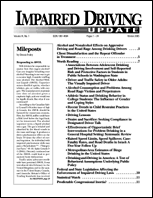What Court Teams and Treatment Providers Should Expect From Each Other to Promote Lasting Change
Author: David Mee-Lee, M.D..
Source: Volume 21, Number 04, Fall 2017 , pp.76-78(3)

< previous article |next article > |return to table of contents
Abstract:
By allowing individuals convicted of a DUI offense to stay focused on compliance with orders to complete an impaired driving program, too many participants were really just “doing time” rather than to “doing change.” Some offenders need only education and risk advice to change, which in turn ensures their own safety and that of the public. But for others, suffering from addiction illness, “doing time” in an impaired driving program delays a person’s engagement in recovery and jeopardizes the public safety with increased recidivism and repeat offenses. Focusing on criminal justice responses to impairment and addiction, the author emphasizes the need to effectively address addiction, if law enforcement is to reduce chronic impairment that may endanger drivers and others.Keywords: DWI/DUI Courts; ASAM Criteria Multidimensional Assessment; Person-Centered Treatment Plans; Outcomes-Driven Treatment
Affiliations:
1: American University.